Restaurants are often seen as safe spaces where people from all walks of life can enjoy a meal and relax. They’re a cornerstone of American culture, with fast food chains and unique local eateries attracting locals and tourists alike.
However, not all restaurants have a clean image. Many well-known chains and local spots have dark and disturbing histories that are often hidden from the public eye. Here are ten such restaurants that have been historically riddled with controversy.
Waffle House
Waffle House is a classic road trip stop for those in the Southern U.S., known for its hearty breakfast and diner-style food. It’s a popular choice for travelers and late-night eaters. However, Waffle House is also known for a high rate of violent crime, including robberies and murders.
In one instance in 2018, a man named Travis Reinking opened fire at a Waffle House in Nashville, Tennessee, killing four people and seriously injuring two others. This was just one of several shooting incidents at Waffle Houses across the United States in recent years, making it known as a dangerous place to dine.[1]
Heart Attack Grill
Located in Las Vegas, Nevada, the Heart Attack Grill is famous for its huge portions and high-calorie menu items. They offer massive burgers with up to eight patties, containing nearly 20,000 calories each, along with fries cooked in pure lard, alcoholic drinks, and “butterfat” milkshakes.
The restaurant has faced controversy for glorifying obesity, especially with its policy that customers who weigh 350 pounds (163.3 kilograms) or more eat for free. The servers are dressed like nurses, prepared for any “emergency.” Sadly, people have suffered heart attacks in the dining room while eating their “bypass burgers.”
In February 2013, 52-year-old John Alleman collapsed and died of a heart attack after eating at the restaurant. This wasn’t the first heart-related incident at the Heart Attack Grill, with two previous incidents sending customers to the emergency room. In response to calls to shut down the restaurant, the owner displayed one customer’s cremated remains as a badge of honor.[2]
Domino’s Pizza
Domino’s Pizza is a familiar and popular pizza delivery chain across North America, but it has a dark side. In the ’80s, Domino’s created a mascot called the Noid, a man-rabbit hybrid, as part of their advertising campaign. The Noid was a hit, boosting sales and competing with Pizza Hut. However, an incident cut its run short.
On January 30, 1989, a man named Kenneth Noid entered a Domino’s in Chamblee, Georgia, with a revolver. He demanded $100,000 and took two employees hostage, believing the company’s commercials were a personal insult to him.
Although no one was hurt, Noid was found not guilty by reason of insanity. This turned the Noid into a PR crisis, and after Kenneth Noid committed suicide years later, still believing the mascot was meant to insult him, Domino’s removed the character to distance themselves from violent crime.[3]
Domino’s drivers have also been victims of robberies, including a 2022 murder of a delivery driver in Detroit.
Arby’s
Finding a human finger in your roast beef sandwich is the last thing anyone would want. But at an Arby’s in Michigan, a 14-year-old boy found just that. It turned out an employee had accidentally sliced off part of their finger in the meat slicer but didn’t report it. Arby’s apologized, calling the situation “unfortunate.” The chain was allowed to continue serving customers after a cleanup.
In another incident, a man from Tipp City, Ohio, sued Arby’s after finding a piece of flesh in his sandwich. The restaurant manager had sliced skin off his finger while chopping lettuce and failed to throw out the contaminated lettuce.[4]
Arby’s representatives defended their employees, stating that the manager destroyed the product around the slicer and did what he thought was right. Arby’s customers should probably inspect their sandwiches carefully.
Comet Ping Pong
During the 2016 U.S. presidential election, social media was flooded with false claims that Comet Ping Pong, a pizzeria in Washington, D.C., was involved in a child sex trafficking ring with Hillary Clinton and was a meeting place for satanic rituals. The restaurant was publicly denounced, and the owner’s information was leaked online.
Fueled by conspiracy theories, Edgar M. Welch drove six hours to the pizza place to “save the victims.” He entered the store with an AR-15-style assault rifle and a handgun, firing a round into the busy restaurant.
Miraculously, no one was hurt, and Welch was charged with several counts, including carrying a gun without a license and assault with a deadly weapon. The pizza joint never recovered from the rumors, demonstrating the real-life damage that online hate campaigns can cause.[5]
Adamson BBQ, Toronto
During the COVID-19 pandemic, most businesses followed social distancing restrictions. However, Adamson BBQ in Toronto refused to close for in-person dining.
The owner, Adam Skelly, repeatedly defied government orders to close, reopening the restaurant each day after Toronto Public Health shut it down. Eventually, authorities padlocked the doors. Skelly faced nine bylaw violations, totaling $187,000 in fines.
Adamson BBQ had been operating without a business license for four years, had a history of public health code violations, and owed about $50,000 in unpaid rent. Even after his arrest and the restaurant’s closure, Skelly continued to post anti-lockdown content on Instagram and filed a constitutional challenge against the city’s restrictions.[6]
Rumors suggest Skelly might be planning a comeback, with the restaurant’s Instagram bio hinting at a “V2 coming soon.” Diners should be cautious, as Skelly has a history of cutting corners to prove a point.
Subway
Subway, the largest chain restaurant in the United States, has had its share of scandals. One of the biggest involved Jared Fogle, who lost 245 pounds (111 kilograms) by eating only Subway sandwiches for a year. Subway made him the face of their healthy eating campaign, but things soon turned sour.
In 2014, Fogle was accused of sending child pornography, and his house was raided. He pleaded guilty to possession and distribution of child porn and traveling to have sex with a minor and is serving a 15-year sentence. Subway had failed to properly vet their spokesperson.
Another scandal, dubbed TunaGate, involved a lawsuit claiming that Subway’s tuna subs lacked tuna. A marine biologist found “no detectable tuna DNA sequences” in Subway’s tuna. A federal judge allowed the case to proceed. Additionally, a Canadian study found that Subway chicken was only half meat, the other half being soy.[7]
Don Diego

In Sutton-Coldfield, Birmingham, England, the owner of the tapas bar Don Diego was arrested and charged with attempted murder. Ahmet Dincer believed that two former employees, Carlos Tirado and Monica Lopes, were plotting to take over his restaurant.
After Tirado and Lopes quit due to unpaid wages, Dincer called them to a meeting in his office, where he attacked Tirado with a baseball bat, sprayed him with CS spray, and shot at him with an air pistol. CCTV footage showed the baseball bat breaking in half during the attack.
Tirado defended himself with a chair and wine bottles, and both he and Lopez fled. Dincer claimed he didn’t intend to kill them, saying he could have if he really wanted to. Dincer also poured accelerant over the restaurant, attempting to set it on fire. He was charged with attempted arson and attempted wounding with intent.[8]
Denny’s
Denny’s has faced issues regarding discrimination in their restaurants. In the ’90s, thousands of customers in California filed complaints alleging civil rights violations. Thirty-two of them sued the chain, citing a “discriminatory corporate culture.”
In one case, a group of Black students at a San Jose Denny’s were asked to prepay for their orders and pay a cover fee before sitting down, while their white classmates were not. Another incident involved a 13-year-old girl being denied a free birthday meal, even with her baptismal certificate.
In another lawsuit, Black secret service agents were seated separately from their white colleagues and waited an hour longer for their meal. Denny’s faced 32 lawsuits across the country and was forced to pay $54 million in settlement funds. Since then, Denny’s has overhauled its diversity policies.[9]
El Parian Restaurants
El Parian Mexican Restaurants in Minnesota were shut down after being revealed as drug fronts and money laundering operations.
Owner Aldo Escoto and two others were charged with possession and distribution of illegal substances and using the restaurants to harbor undocumented immigrants. These Honduran workers “were willing to work long hours for multiple days at a time,” making them attractive employees.
The restaurants were allegedly funded with drug money and used to launder illegally earned cash. Workers were paid in cash, and Escoto purchased properties for them to live in. Drugs were also sold directly out of the restaurants. The stores were sold to new owners upon the trio’s arrest, so customers no longer need to worry about hidden ingredients in their tacos.[10]
From violent crimes to disturbing scandals, the restaurant industry has seen its fair share of dark moments. These stories serve as a reminder that even seemingly normal places can hide shocking truths.
What are your thoughts on these disturbing restaurant stories? Leave your comment below!










